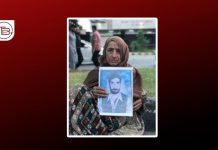Author: Zaarain Baloch
Amidst the intricate tapestry of August, while Pakistan is alive with jubilant decorations for its “Independence Day”, a somber contrast emerges in Balochistan. For the people of this region, the month unfolds not as a time of celebration, but as a profound reflection on historical struggle and defiance. While flags and decorations adorn the streets of Pakistan, a different emotional spectrum takes shape in Balochistan, weaving together narratives of resistance, remembrance, and an ongoing struggle for self-determination.
Balochistan’s narrative during August stands as a unique duality against the backdrop of Pakistan’s national festivity. While Pakistan’s “Independence Day” takes up national attention, Balochistan commemorates its own version of this event – a day that embodies resistance against the perceived imposed rule. This parallel perspective sets a distinct tone for the month, inviting contemplation on the divergent paths taken by two territories that share borders and yet remain distinct and alien to each other. As Pakistan collectively focuses on the celebration, Balochistan’s intricate experiences with perceived imposed rule and the five consecutive waves of raging insurgencies because of it offer a poignant counterpoint, encapsulating the resilience and distinct identity of its people.
August holds profound significance for the people of Balochistan. Among them are Baloch nationalists who view Balochistan not as a legitimate part of Pakistan, but as a colony strained under “imposed rule.” They argue that on August 11, 1947, with the British colonizers withdrawing from the subcontinent, Balochistan emerged as an independent nation on the global map. The Baloch nation reclaimed control over its homeland and destiny. Yet, this hard-won independence was ephemeral. Muhammad Ali Jinnah, the founder and first Governor General of Pakistan, exerted pressure on the Khan of Kalat – Balochistan’s leader – to integrate with Pakistan. Upon refusal, Pakistani forces forcefully annexed Balochistan on March 27, 1948. Since then, Balochistan has witnessed five raging waves of insurgencies, each more lethal than the last. Baloch nationalists argue that the fifth wave, which is currently underway, has the breadth and width of Balochistan under its grasp – it’s more complex, inclusive, and overarching than the previous four.
The “Treacherous Twist”
The Baloch National Movement (BNM), a pro-independence political movement, venerated August 11 as Balochistan’s “Independence Day” in a media statement. According to Dr. Naseem Baloch, the BNM chair, this day signifies the end of a century of British colonial rule over Balochistan. It’s the day when the Baloch nation reclaimed control over their homeland and their shared destiny, he said.
Drawing from the annals of history, the BNM chairman asserted Balochistan’s distinct status in the pre-partition subcontinent. He said that on August 4, 1947, the Khan of Kalat, the ruler of Balochistan, sat down with the British leaders of the subcontinent and Muslim League’s Muhammad Ali Jinnah to sign a document that declared Balochistan an independent and sovereign nation. A week later, on August 11, Balochistan’s independence was officially announced to the world from the Viceroy House in Delhi. But the independence was short-lived, he lamented, as the British colluded with Jinnah to launch a full-scale invasion of Balochistan, effectively occupying it. To this day, Balochistan remains under imposed rule, he said.
“Rather than passively accepting their bleak destiny, the courageous Baloch freedom fighters fiercely battled for their independence. . . Despite challenges, the Baloch never yielded to those who occupied their homeland. An unprecedented wave of insurgency surges forward, unyielding until Balochistan reclaims its liberation,” he said.
The Mashkay chapter of the BNM convened a gathering to commemorate August 11. In this gathering, the speakers passionately recounted the sacrifices of their ancestors who “shed their blood for Balochistan’s autonomy.” Addressing the gathering, BNM leader Sheh Baloch said, “These martyrs are testaments to Balochistan’s undying quest for sovereignty . . . Some fell, while others chose self-exile, yet none relinquished their commitment to the cause. This steadfast determination has weathered decades and centuries, a reminder that true independence takes time. Balochistan’s path may be arduous, but the journey towards sovereign nationhood remains unswerving”, he said.
The Baloch Students Organization Azad (BSO-Azad) commemorated August 11 as a turning point in history, signifying the end of a hundred years of British rule over Balochistan. The group said that regrettably, this newfound independence was snatched away less than a year later by Pakistan’s full-scale invasion. “Balochistan’s 75-year subjugation stands as a testament to its resilience in the face of occupation. However, valiant Baloch figures like Mehrab Khan, Noora Mengal, and Khalil refused to submit, courageously fighting against occupiers to secure Balochistan’s independence. Their martyrdom thwarted complete British control,” the organization said.
Baloch Armed Groups’ Perspective
Baloch armed groups’ echoing pro-independence sentiments also observe Balochistan’s “Independence Day” annually. These groups also embrace a heightened tempo of activities during August. The month experiences increased violence, targeting not only Pakistani security forces but also those selling decorations for Pakistan’s “Independence Day.” August 14 is designated a “Black Day” by these groups, urging individuals to abstain from celebrating.
The incidents of violence in August as usual saw a rise in Balochistan. In two separate attacks, the armed groups targeted stalls selling Pakistani flags just a couple of days earlier for the upcoming “Independence Day.” These attacks, involving hand grenades, resulted in several injuries, including the stall owners.
A few days later, on August 13, the Baloch Liberation Army (BLA) launched an assault on a convoy of Chinese engineers, accompanied by Pakistani forces, in Gwadar. The BLA issued a statement claiming responsibility for this attack, revealing that it was executed by two “fidayees” belonging to the Majeed Brigade, a particularly lethal faction of BLA known for its expertise in suicidal attacks. Immediately after the attack, the Pakistani security forces cordoned off the area and started a search operation. The Balochistan Post learned from local sources that the forces carried out multiple raids and “forcibly disappeared” several individuals.
The BLA released a detailed account of its attacks targeting Pakistani security forces and events celebrating Pakistan’s “Independence Day.” The group said its fighters carried out eight coordinated attacks in Bolan, Turbat, Panjgur, Kalat, and Mastung, resulting in casualties and multiple injuries. The group reiterated its commitment to target “occupying forces” until the “liberation of Baloch motherland.”
The series of attacks by BLA didn’t stop there, it carried out several more attacks throughout the month.
The Balochistan Liberation Front (BLF), another armed “pro-independence” group, claimed responsibility for multiple attacks targeting the Pakistani security forces in August. The BLF claimed that the Pakistani forces sustained multiple casualties and injuries in the attacks. Moreover, the forces also sustained critical material damage, the group said.
As per the reports, at least 84 militant attacks were carried out by the Baloch armed groups across Balochistan.
Security Forces Push Back
Sensing the heightening tensions up ahead, the Pakistani security forces launched a preemptive counterinsurgency operation in Zamuran on August 11. Ground forces, supported by gunship choppers and military drones, reportedly ventured deep into the region. Activists have raised concerns over the military operations, claiming that these operations are a guise for unchecked “enforced disappearances” and “killings”. The BLF also clashed with security forces in Zamuran, resulting in the loss of two of its fighters, the group said in a media statement: “The martyrs killed two soldiers of Pakistani forces and wounded several before they embraced martyrdom.”
Enforced disappearances in Balochistan have also seen a sudden but predictable rise in the month of August. The Balochistan Post has documented at least 59 cases of enforced disappearances throughout the month, an alarmingly high figure. A few of the detainees have returned, but the majority remain missing, potentially locked up against their will. The Gwadar search operation following the Majeed Brigade’s attack and the Zamuran counterinsurgency operation have also added to the number of enforced disappearances.
Meanwhile, Baloch activists have highlighted the security forces’ campaign against them. Hooran Baloch, a human rights activist, and organizer of the Voice for Baloch Missing Persons, shared in a press conference in Quetta how her family has faced harassment and threats due to her activism. The security forces reportedly intruded upon their home, attempting to quell her efforts by intimidating her family members.
TBP also documented that over 60 raids, blockades, and military operations were conducted by Pakistani armed forces throughout Balochistan in the month of August. Among the violent incidents, the discovery of 9 dead bodies was also reported.
The month of August also witnesses the anniversary of a significant Baloch leader Nawab Akbar Bugti’s death. His assassination by Pakistani forces on August 26, 2006, in Kohlu remains a pivotal moment in Balochistan’s history. Nawab Bugti was distraught with the Pakistani state over perceived injustices to the people of Balochistan and the state’s unwillingness to give the Baloch people a larger share in their own natural resources. The rape of a female doctor in Sui, Dera Bugti, allegedly at the hands of a Pakistani military official, was the pivotal tipping point.
Bugti took up arms after Pakistani officials, including the then-dictator Parvez Musharraf, refused to hand over the alleged culprit. The Pakistani forces carried out full-scale operations in Dera Bugti to corner Bugti, but he fled to the mountains and resorted to guerrilla warfare. Bugti was killed when the cave he was residing in was felled over him, allegedly by the Pakistani forces’ attacks. To the people of Balochistan, Bugti became a symbol of resistance. To the Pakistani state, he was a criminal challenging their authority.
August, for Balochistan, is a month that bathes in blood and symbolism. Baloch nationalists and “pro-independence” groups experience a unique blend of celebration and mourning. This is a month when Balochistan briefly tasted independence before it was “snatched away”. It’s also a month when the “occupier”– Pakistan – made it to a country on the world map. August carries bittersweet feelings in Balochistan, tilting more toward the bitter side. The dichotomy of emotions continues to shape the narrative of this resilient land, standing as a testament to the enduring spirit of a people in search of true sovereignty.






























